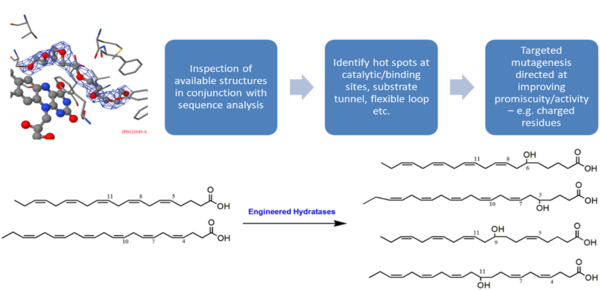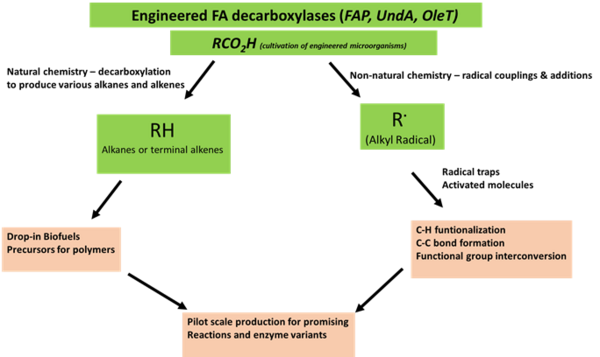1) Engineering of Enzymes for Efficient Production of Value-added Chemicals from Sustainable Resources:



2) Discovery and characterization of new enzymes and enzymatic pathways:
With the advances in biological sciences over the last couple of decades, it is now possible to access total genome and proteome information of various organisms. This enables researchers to perform bioinformatics search to find known metabolic pathways in a new organism or to find a new pathway that has been unknown in any organism before. There are increasing numbers of protein encoding genes that has been identified and sequenced, but the functions of the translated proteins from many of these genes are either unknown, or poorly predicted, or even sometimes falsely annotated. Using bioinformatics approaches coupled with experimental enzymology studies, many of these genes can be identified with new functions or with functions only known in certain organisms. Exploration of their reactions will lead us to discover potential catalytic candidates for industrial and/or medical applications.
3) Mechanistic Enzymology:
A clear understanding of the chemical and kinetic mechanisms of enzymatic transformations is important for engineering and establishment of production strategies with enzymes. In order to engineer enzymes by rational design and to find the optimum conditions for efficient production, characteristics of the enzyme such as kinetic behavior, inhibition patterns, substrate scope, cofactor requirement, rate-limiting step and optimum pH/temperature should be investigated in detail. We use methods including steady-state and transient-state enzyme kinetics, various types of spectroscopy, isotope-labeling experiments and site-directed mutagenesis to reveal the mechanism of the enzymes that we aim to engineer. The results from such experiments present us important guidelines for rational protein design as well as for fully exploring natural and non-natural capabilities of the enzymes. Moreover, such mechanistic information also contributes to current scientific knowledge on the working principles of enzymes.

RESEARCH TOOLS
In our research, we use various experimental approaches including common molecular biology techniques (gene cloning, PCR, plasmid purification, site-directed mutagenesis etc.), protein expression and purification, general protein characterization techniques, rational and random protein engineering methods, enzyme kinetics, enzyme activity analysis and assay design, product analysis and identification by chromatographic and spectroscopic methods (GC-FID, HPLC, GC-MS, NMR). Our methodology covers a broad range from molecular biology and bioinformatics to chemistry and biophysics.